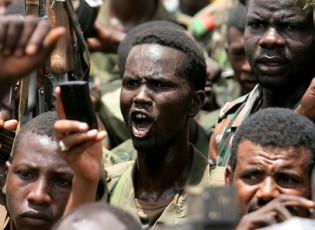Sudan & South Sudan trade accusations of defying UNSC resolution
May 3, 2012 (KHARTOUM) – One day after the UN Security Council (UNSC) ordered them to cease hostilities within 48 hours, Sudan and South Sudan are already accusing each other of committing fresh military assaults.

Aguer also said that another attack involving aerial bombardment and long-range artillery targeted an army base about 25 km away from Panakuach.
The accusation followed the adoption on Wednesday of a UNSC resolution directing both countries to cease all forms of hostilities, including aerial bombardment, within 48 hours.
Furthermore, the UNSC resolution ordered the two sides to withdraw troops from disputed border regions, including Abyei, within a week in order to prepare for the establishment of a demilitarized border zone.
The UNSC resolution also threatened both countries with non-military sanctions if they don’t conclude negotiations over borders, oil exports and citizenship rights within three months.
Across the border in Khartoum, the spokesman of Sudan’s foreign ministry, Al-Obayd Adam Marawih, issued a statement declaring his country’s commitment to the UNSC resolution with regards to cessation of hostilities.
However, Marawih said that South Sudan had already defied the order and attacked on Thursday the areas Um Dafoug in South Darfur State, Samaha in the newly created state of East Darfur and Talodi in South Kordofan State.
The spokesman is likely to be referring to attacks by the army of the Sudan People’s Liberation Movement North (SPLM-N), a Sudanese rebel group fighting to topple the government in Khartoum from South Kordofan and Blue Nile States.
Khartoum says that SPLM-N rebels are still part of South Sudan’s army alongside of which they fought during the north-south civil war in the once-united Sudan.
The Sudanese diplomat also said that South Sudan had already occupied disputed border areas, including Kafia Kingi and Kafia Dabi.
Marwaih warned that Sudan would be entitled to self-defense if South Sudan does not commit to cessation of hostilities and withdrawal of troops.
He reaffirmed Sudan’s commitment to the Abyei Protocol of the 2005 Comprehensive Peace Agreement (CPA) as well as to implementing the withdrawal of its troops from the region as per the agreement for temporary administrative and security arrangements for Abyei signed in Addis Ababa in June 2011.
Sudan occupied Abyei in May last year and is yet to withdraw troops despite agreeing to do so under the Addis Ababa deal.
Regarding the UNSC resolution, Marawih expressed Khartoum’s positive view of some of its elements, including condemnation of South Sudan’s brief occupation last month of Heglig region as well as calls for assessing the damages allegedly inflicted by the southern army on oil infrastructure there.
However, he maintained that Khartoum will undertake further review of the resolution.
Khartoum is unhappy with the African Union’s decision to involve the UNSC in the roadmap it drew last week to force the two countries to cease hostilities and return to negotiations.
Marawih said in an interview on Wednesday that Khartoum has reservations over the three months ultimatum for concluding talks with South Sudan.
On the other hand, South Sudan said it has agreed to the UNSC resolution. The country’s Minister of Cabinet Affairs Deng Alor Kuol affirmed on Thursday that South Sudan would comply with the resolution.
(ST)
Al Jazeera English | UN threatens sanctions over Sudan dispute | 2 May 2012
